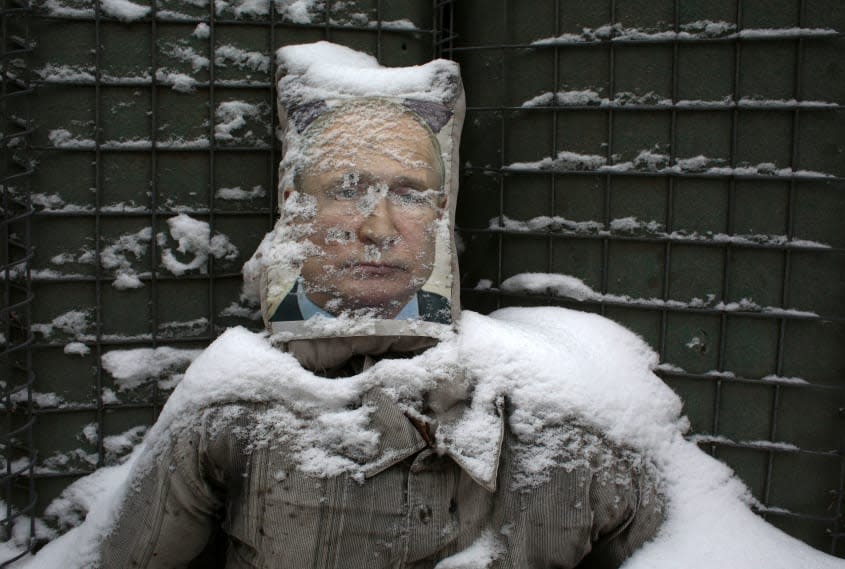Why Putin's nukes announcement could mean a new era of nuclear proliferation

- Oops!Something went wrong.Please try again later.
Has the Cold War returned? Russian President Vladimir Putin on Tuesday announced that he is "suspending" the New START treaty with the United States, The Washington Post reports. The treaty limits the number of nuclear warheads on each side and includes verification requirements — something that is no longer possible, Putin said, given how relations between the two countries have broken down in the aftermath of Russia's invasion of Ukraine. "Our relations have degraded, and that's completely and utterly the U.S.'s fault," Putin said. That decision is "deeply unfortunate and irresponsible," said the U.S. Secretary of State Anthony Blinken. What is the New START treaty? And is a new nuclear arms race in the offing? Here's everything you need to know:
What is the New START treaty?
The treaty, signed in 2010, limits both Russia and the U.S. to "no more than 1,550 strategic nuclear warheads and a maximum of 700 long-range missiles and bombers," Reuters reports. Both sides can conduct up to 18 inspections of the other's "strategic nuclear sites" every year. Verification is done through a variety of means, including satellite scans, on-site inspections, and the sharing of telemetry from test launches. The inspections were put on hold due to the COVID pandemic in 2020 and have never resumed since then.
Was this a surprise?
Not really. The Wall Street Journal reports that the State Department notified Congress in January that Russia had already violated the treaty "by refusing to allow on-site inspections and rebuffing Washington's requests to discuss its compliance concerns." The Ukraine war — and America's support for Ukraine — was part of Russia's rationale for refusing the inspections: Hanna Notte of the Vienna Center for Disarmament and Non-Proliferation told NPR at the time that "the question is really how long the Kremlin will believe it can try to blackmail the United States into abandoning support for Ukraine by threatening disruption to the New START treaty."
What does 'suspension' mean?
It means the treaty may not be entirely done for — at least not yet. Mikhail Ulyanov, a Russian government official, wrote on Twitter the suspension "does not mean withdrawal" from the treaty. He added that "return to the Treaty remains possible under certain circumstances." But CNBC points out that Putin may intend a broader range of nuclear activities than simply refusing inspections. "Putin further warned in his speech Russia could resume nuclear tests."
What other arms agreements have fallen apart?
Again, the New START treaty was the "last remaining" nuclear arms agreement between the U.S. and Russia. But that's not all as a result of the Ukraine war — relations between the two countries were deteriorating even before that. In 2019, the Trump administration pulled out of the INF Treaty, a pact signed by former President Ronald Reagan with Soviet leader Mikhail Gorbachev back in 1987. That agreement was intended to eliminate the two countries' arsenals of short- and intermediate-range nuclear missiles. But the United States said that Russia had violated that agreement by creating a new missile system. And in 2020, then-President Donald Trump announced he was pulling the U.S. out of the Open Skies Treaty, which The New York Times described at the time as an agreement "to allow nations to fly over each other's territory with elaborate sensor equipment to assure that they are not preparing for military action."
Does this mean a new era of nuclear proliferation?
That's the worry. In early February — after the State Department warned that Russia was violating New START — the Federation of American Scientists warned the U.S. and Russian nuclear arsenals "could double in size" if arms control agreements collapsed entirely. That could trigger other countries, including China, to ramp up their nuclear arms production, with "ripple effects for India, Pakistan, and elsewhere – developments that would undermine, rather than improve, US and international security." And Salon reports that Daryl Kimball, director of the Arms Control Association, warns that Putin's decision could mean "there will be no limits on U.S. and Russian nuclear arsenals for the first time since 1972."
What's next?
The New START treaty doesn't officially expire until February 2026 — presumably leaving U.S. and Russian officials time to jump-start efforts to bring arms control back online. But the Bulletin of Atomic Scientists laments that "Russia and the United States are unlikely to agree on a formal follow-on treaty to New START anytime soon." That could mean a return to Cold War-style conditions, David Sanger writes in the New York Times, "when arms races were in full swing and nations could field as many nuclear weapons as they wanted."
You may also like
Why U.S. teens aren't getting their driver's licenses

